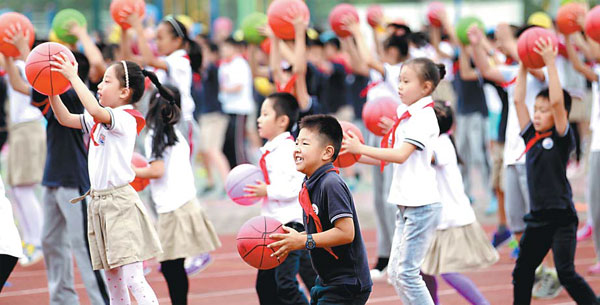Help migrant workers become new citizens

City government's points-ranking system proves a success
Migrant workers are considered by many Chinese cities to be a drain on resources. But that is not the case in Zhangjiagang, Jiangsu province, where the local government launched a points-ranking system to integrate "new citizens" in 2012. Included in the program to turn them into permanent residents is community service.
"We launched the system three years ago, amid a national shortage of labor, to attract more technicians to Zhangjiagang," said Hui Hong, deputy-director of the city's new citizen affairs center and a key architect of the system.
| Tangshi Primary School is the largest school for children of newly settled migrant workers, who make more than 70 percent of its total enrollment. The government has invested 200 million yuan ($31.4 million) in the school since 2012. |
Zhangjiagang also pioneered an electronic system of helping migrant workers, or new citizens as they are known in the city. Scanning a code with a smartphone, workers can look for job vacancies, houses to rent and other crucial information.
"I feel the city is very friendly to us," said Li Shuo, 28, a plumber from Zhangqiu, Shandong province. "Everything is ranked, including such things as medical insurance and education for our children.
"Transparency is the most important thing that makes the scoring system function well," Li added. "I know my score, my position in the rankings and most importantly how I can increase my score. This involves learning new techniques and serving the community."
Zhangjiagang has about 1.6 million residents, half of whom are migrant workers. Since the scoring system was launched, more "new citizens" are deciding to settle in the city.
"We are not short of workers," Wu Huifang, deputy-general manager of Yonggang Group, a steel enterprise in Zhangjiagang that employs about 12,000 migrant workers, said.
New citizens enjoy not only welfare benefits, but also legal rights such as the ability to vote and participate in discussions on public policies.
"That makes true citizens," Wu said.

According to Hui, about 500 migrant workers have moved their permanent residential registrations from their hometowns to Zhangjiagang since the program was launched. More than 10,000 new citizens enjoy medical insurance, and about 26,000 children from migrant families attend schools through the program.
"We will adjust the scoring system to the needs of the people," Hui said. "The new citizens have a stronger desire to send their children to good schools. That's what we are working on in the future."
Tangshi Primary School is the largest for children of new citizens. The government has invested more than 200 million yuan ($31.4 million) in the school since 2012. About 74 percent of its 2,638 students are from migrant families.
Experienced teachers have transferred from other schools, while the facilities have been upgraded. The school focuses on developing students' interest in traditional Chinese culture, sports and art.
The basketball team is one of the best and has won the city championship on several occasions. Yao Ming, the former Chinese basketball star player, wrote in the school's guest book in 2009: "Happy basketball and a happy life".
Tangshi Primary covers an area of 49,000 square meters and is constructed according to the traditional style in the south of Jiangsu. It features white walls, black tiles, a ridged roof and small gardens. Many migrant workers mistake the school and its grounds for a park when they first visit it.
"The children from new citizen families are great assets for Tangshi. They come from different regions across China, speak different dialects, and have different cultures and experiences before coming here," said Huang Bi, headmaster of the school.
"Their cultural diversity contributes to the very fabric of our school and broadens the outlook of all our students. Some of them live in difficult conditions, but this means they are very motivated," Huang added. "The best students in music, sports and art are mostly from the migrant worker families."
The local government now ensures all children from new citizen families attend school. Many migrant workers even persuade their relatives and friends at home to move to Zhangjiagang just for the quality of education it offers.
But then, even retired new citizens benefit the local community. Zang Jiyun, 65, who used to work at a power plant in Xuzhou in the north of Jiangsu province, volunteers to teach "keep fit" boxing classes. This form of martial arts dates back 4,300 years.
"I learned it from my master Fang Dancai in my hometown. It is very good for people's health," said Zang, who has about 30 students and practices boxing every morning beside Jianghu Lake. "I hope boxing can benefit more local people."
Many migrant workers are attracted to Zhangjiagang because of the benefits on offer. "Our public policies attract new citizens," said Yang Fang, the former vice-mayor of Zhangjiagang in charge of public well-being, who is now director of the information office.
"They work in the city and should enjoy the benefits. In a rapidly aging society like China, the vitality of a city lies in its hospitality to newcomers."
(China Daily European Weekly 10/22/2015 page5)
Today's Top News
- Japan tempting fate if it interferes in the situation of Taiwan Strait
- Stable trade ties benefit China, US
- Experts advocate increasing scope of BRI to include soft power sectors
- New engine powers cargo drone expansion
- China to boost green industry cooperation
- Manufacturing PMI rises in November































